Relationship between obesity and psychosocial risk factors in hypertensive patients
DOI:
https://doi.org/10.2478/amma-2021-0030Keywords:
hypertension, obesity, overweight, psychosocial risk factorsAbstract
Unhealthy lifestyle habits, including sedentary behaviour and improper diet are major risk factors for obesity. Overweight is very frequent in hypertensive and type 2 diabetic patients. Psychosocial factors are associated with multiple health behaviors related to overweight/obesity. The aim of the study was to evaluate the relationship between obesity and psychosocial risk factors in hypertensive patients having different levels of education. Material and methods: 623 hypertensive patients, admitted to the Cardiovascular Rehabilitation Clinic in Tîrgu Mureș were evaluated by weight, height, waist circumference, laboratory analyses and psychosocial risk based on a validated questionnaire on nine topics.The study was approved by the Ethical Committees of theMureș Emergency Clinical County Hospital and that of the UMPhSTGEP. Statistics were performed by IBM-SPSS-22, GraphPad-InStat-3.Results: Obesity or overweight affected 86.9% of the studied hypertensive patients. Obesity was more frequent in subjects having type 2 diabetes as comorbidity. Mean BMI was significantly higher in the lower education group (p=0.007) compared to those with higher level of education. Average triglyceride and uric acid levels were significantly higher in obese subjects compared to those having lower BMI (p<0.0001). Patients living alone had significantly lower mean BMI (p=0.006) and waste circumference values (p=0.001) compared to those living with their spouse.
Conclusions: Weight excess in very frequent in the studied hypertensive patients, especially in those with type 2 diabetes as comorbidity and having lower educational level. Hypertriglyceridemia and hyperuricemia occurred more frequently in obese subjects compared to non-obese ones. Overweight is less frequent in patients living alone.
Keywords: hypertension, obesity, overweight, psychosocial risk factors
Downloads
Published
How to Cite
Issue
Section
License
Acta Marisiensis Seria Medica provides immediate open access to its content under the Creative Commons BY 4.0 license.









